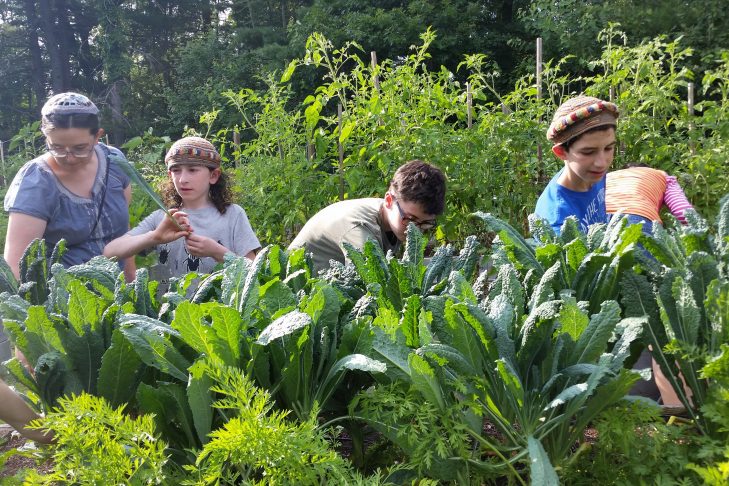On this late summer day, I am here with more than a dozen men, women and children from Temple Israel of Natick at the Interfaith Community Garden in Natick. We have gathered to tend the garden that we are growing as an act of hesed, loving-kindness for those in need.
We quickly get to work weeding, watering plants and harvesting vegetables for A Place to Turn, a local emergency food and clothing pantry. Our volunteers fill grocery bags with freshly picked kale, beans, carrots and herbs and bring it to A Place to Turn which, in turn, immediately distributes to its clients the fresh produce as a healthy alternative to canned vegetables.
Now in its fourth summer, this initiative is the brainchild of the Rev. Eric Markman, pastor of the Hartford Street Presbyterian Church in Natick. “It’s a way for communities of faith to take action together to create a better world by performing acts of loving-kindness,” he said.
The project was conceived in 2015 when Markman became the new pastor and learned that the church owned five adjacent acres. “This was a prime piece of land that could lend itself well for a community garden,” said Markman, who began discussing potential uses with the church board. “As quickly as the discussion to create a garden started, we also decided that at least part of it should be dedicated to growing vegetables for our food pantry, A Place to Turn.”
The next step was to review with the Town of Natick the logistics of creating a community garden, including plans to dedicate four plots for an interfaith garden. After securing town approval, Markman walked a few steps down the street to Temple Israel because the two institutions have enjoyed a strong long-term relationship.
“Rabbi Dan Liben immediately expressed interest in the project and we had our first partner,” explained Markman. The two discussed reaching out to the local mosque, and soon they had created a partnership with the synagogue, the mosque and the church. This summer, volunteers from Temple Israel of Natick, the Hartford Street Presbyterian Church and the Islamic Society of Framingham have rotated turns tending the garden, which was planted by the local Fox Hill Garden Club.
From day one, the project has been a community effort. Students from Keefe Regional Technical School in Framingham built 56 special raised wooden bins for the raised-bed garden so organic soil could be used for the garden; raised beds make it easier to tend each plot. Fifty young people from three Natick churches, the synagogue and the mosque worked together to seal and weather-proof these beds, and then shared a meal. “It was a beautiful day to see the young people from different faith traditions working together to create something good for the community and especially for those in need,” said Markman.
The Ark Builders, Temple Israel’s group of volunteer woodworkers, built a special olla-based watering system, ceramic containers dug into the ground. The opening on each olla fills with water that slowly seeps into the ground to water the plants throughout the day, while keeping weed infestation to a minimum.
It’s also been a teaching opportunity for our suburban volunteers. In addition to honing their gardening skills, they have witnessed first-hand that food insecurity is as much a problem in the MetroWest suburbs as in Boston’s inner city.
For Temple Israel’s Blacker family, community participation has been especially gratifying. Daphne loves watching the kids carry the produce from the garden to the pantry, while her sons appreciate the opportunity to help. “I loved the feeling of helping our community and the people who are less fortunate than us,” said 13-year-old Asher, echoed by his 16-year-old brother, Noam, who has shared his extensive gardening experience working at a local organic farm. “I felt good knowing that the food was truly appreciated,” said Noam.
Over 10% of Eastern Massachusetts residents are food insecure, nearly 50% of whom are children. In fiscal 2019, A Place to Turn has provided food assistance to 3,710 families (12,207 individuals) in Framingham, Natick, Marlboro, Ashland, Hudson, Milford, Sudbury and Wellesley.
“We would like to continue to ensure that large amounts of the food we distribute is nutrition-rich. Our food pantry makes the offerings of fresh fruits and vegetables a priority,” said Joanne Barry, executive director of A Place to Turn. “Hunger is the absence of good nutrition, so we really pride ourselves on healthy options. The people we assist are always so impressed by the beautiful vegetables grown for A Place to Turn in the community garden and we are proud to be able to offer these items.”
The relationship between Temple Israel and the Hartford Street Presbyterian Church, dating back to when both institutions built their buildings in the early 1960s, has stayed strong ever since. Each institution has also shared the other’s building in times of need. In 2002, during a synagogue renovation project, the church graciously housed Temple Israel for Shabbat services, even covering crosses and Christian ritual items as an act of respect. Subsequently, as a token of appreciation, the Temple Israel Ark Builders custom built a table for the church. And this past year, when the church experienced a plumbing leak, Temple Israel reciprocated the favor by hosting its neighbor for Sunday worship services.
In recent years, as the world has turned darker, this partnership has grown stronger, demonstrating by action the power of love, rather than hate. The church also voted unanimously to provide the synagogue a key to its building in case of an emergency and need for immediate shelter when the church is locked.
When the heinous attack took place on the two mosques in Christ Church, New Zealand, both Temple Israel and the Hartford Street Presbyterian Church responded quickly with letters and phone calls of deep condolences and support. When the Tree of Life Synagogue was brutally attacked in Pittsburgh, the church wrote a letter of support and solidarity which the entire congregation signed and carried the half block to the synagogue immediately after Sunday worship services, and, as the letter was delivered and read, church members volunteered to stand outside Temple Israel during services and gatherings to make sure their brothers and sisters in faith were safe to worship.
“Rev. Markman and the members of the church understand that partnerships may begin with welcoming words, but they are sustained by action,” said Rabbi Daniel Liben, spiritual leader of Temple Israel of Natick. “The garden gives members of different faith communities the opportunity to work together with our hands, to literally watch something grow, and to fulfill our mutually held obligations to feed the hungry, together. What could be a better way to strengthen a community partnership than that?”
This past July, Rabbi Liben and Rev. Markman engaged in our first-ever pulpit exchange: On July 13, Rev. Markman delivered the Shabbat sermon at Temple Israel, and the following week Rabbi Liben delivered the Sunday morning church sermon. As synagogue and church members worshipped jointly at both services, we became more familiar with the liturgy and ritual practices of each faith community as one step toward better understanding what we have in common.
By working passionately toward a common goal, we have planted seeds of friendship. We have learned each other’s traditions, broken bread together and socialized over vegetarian meals. In so doing, we have come to understand better the common bonds that unite us. Importantly, this initiative underscores why communities of faith must forge and sustain partnerships for the long-term, rather than just during times of crisis.
Kari Sortland, a member of the Hartford Street Presbyterian Church, summed it up: “In our world today, if we do not learn how to work together, we will simply destroy each other.”
This post has been contributed by a third party. The opinions, facts and any media content are presented solely by the author, and JewishBoston assumes no responsibility for them. Want to add your voice to the conversation? Publish your own post here. MORE



